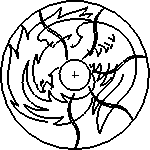
|
We've classified our product by the energy source(s) & sink(s)
|
- 100% Prompt Solar -- Power produced when the sun shines.
- Available Solar & Demand Thermal -- Prompt solar with fuel-fired
backup; High availability.
- 100% Thermal -- Power produced subject to
heat source / fuel
availability.
- 100% Solar -- Load averaged over 12|24 hours.
( availability TBD )
|
The sinks or loads for energy are your local facility, and/or the the local
utility grid.
Let's take a closed look at each of the options.
100% Prompt Solar, Grid Connected.
This is the best solution for most applications. The reason is
simple. It simply delivers low-cost energy into your infrastructure when
available. There is nothing else to think about. Nothing else to
worry about. The "cost" of the energy is simply the one time
capital expense over the "life" of the system (we use 20 years for comparability
with PV & others, but 30, 40, or 50 is probably closer to the truth, we
build 'em that good). The "sale price" your energy fetches is
a function of capacity, load, demand, and market conditions. The simplest and most cost effective
solution. It is a complete stand-alone application with limited dark start1
capacity.
Available Solar & Demand Thermal, Grid Connected or Isolated.
This is the basic 100% Solar, with the addition of a fuel-fired boiler, for
those consumers that need uninterruptible power. There are circumstances
where this option makes economic sense. If your electric load/demand is such
that the STS can meet 100%, then the addition of a fuel-fired boiler, of
suitable capacity, extends the operating window of the STS to 100%
full-time. The rational is straight forward; when the sun is available,
the fuel consumption is zero. As the sunlight diminishes, the fuel
consumption rises to make up the difference in electrical and thermal demand. Although
the electricity generated from fuel is more expensive, the cost is comparable
to a gas or diesel genset of similar capacity. The savings is in not
having to own both units. The fuel-fired STS acting in exactly the same
role as a backup generator, with full dark-start1 capability.
100% Thermal, Grid Connected or Isolated.
For customers with access to large quantities of waste heat, the STS
engine/generator separated from the solar panels. Since the STS can
operate from quite modest temperature sources, this option can make economic
sense in many circumstances, depending on the high temperature, heat and mass
flow. By substituting the appropriate counter-flow heat exchanger for
the solar panels, the engine can be driven reliably from even fairly low
temperature sources 230F(110C). Contact STS for more information.
100% Solar, Load Averaged, Grid Isolated.
This seems to be the solution many folks ask for, and even seem to
want. The difficulty of storing large quantities of energy in ant
reasonable volume, makes this the most expensive option. We at STS are
pursuing various options for the storage of meaningful quantities of energy;
progress is slow. Although we can collect and store a day's worth of
energy, by roughly de-rating the system by 66% to 75%, the economics are still
lass than favorable. We can offer several options for energy storage,
from commercial off-the-shelf (COTS) technologies, and our own
hot-high-pressure media storage vessels.
If you are a producer of electric power for utilities, and
contract consumers
Then some combination of 2, 3, or even all 4 options may be best for
you. Any solar energy collected represents an almost free source of
energy. Much if the heat that is currently wasted also represents a very
inexpensive source of energy that would otherwise be wasted. Combining
solar and waste while supplementing the heat with demand fueled heat source
provides high reliability power at reasonable rates.
1) Here "dark-start" is a term used by the generation industry
that refers to the ability of a generating station to power up, isolated from an
external source of EMF. The irony of calling a 100% solar-powered
generator "dark-start" merited a footnote; the unit can only
dark-start when the sun is shining. I guess we should call it
"Bright-Start" (tm).
|